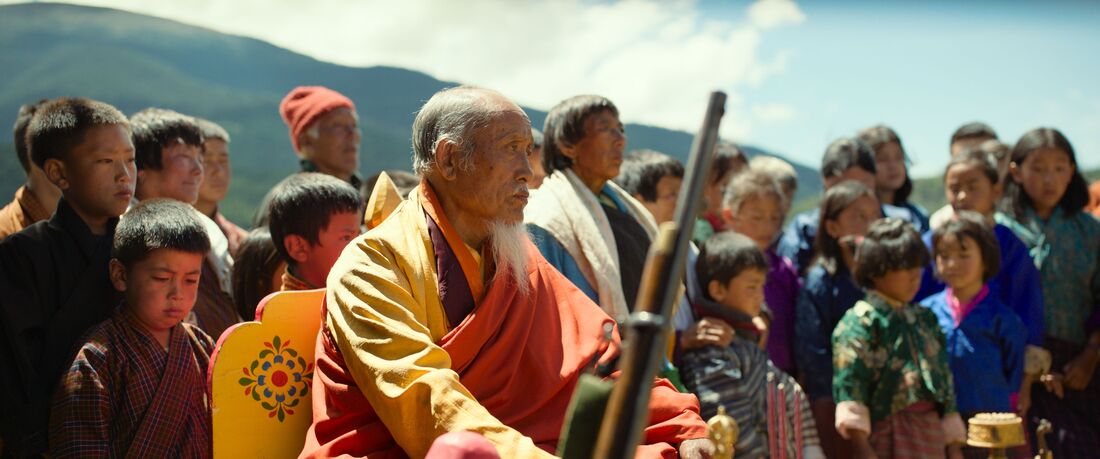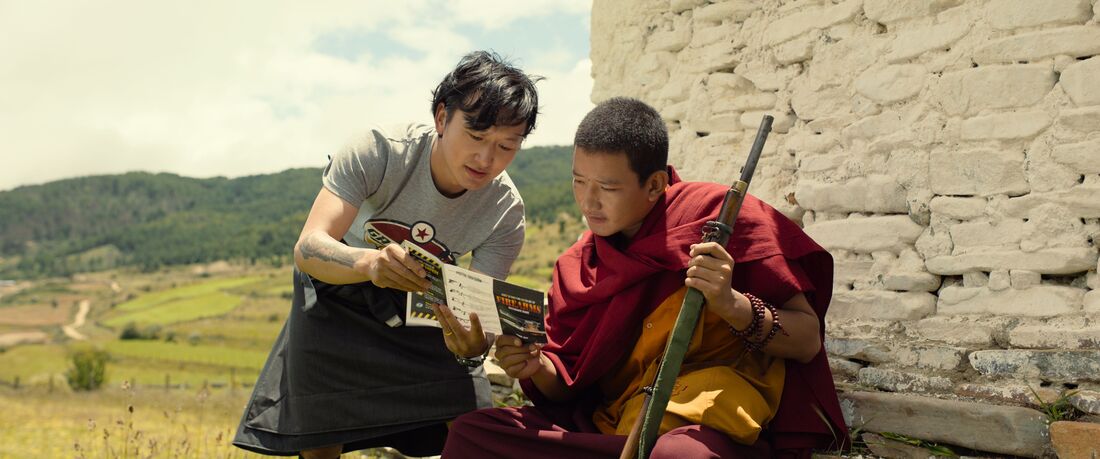THE MONK AND THE GUN -- Pensive Dramedy Questions the Value of Western Hegemony, Capitalism2/9/2024 Review by Daniel Lima After centuries of Western dominance in world affairs and decades of the globalist neoliberal world order, it can be easy to fall into the mindset that all the identifiers of Western society are somehow inherently good. The economic systems, the political structures, the moral values, for those who live in the West — certainly for Americans — the idea that these represent the pinnacle of the evolution of a civilization can border on religious dogma. Part of what makes The Monk and the Gun so refreshing is it directly challenges this supposition, asking whether concepts like democracy and capitalism actually benefit people when exported and enforced. The film is set in a rural Bhutanese village in 2006, shortly after the king's abdication. As the country prepares to hold its first national elections, small teams have been dispatched nationwide to ensure the populace understands the democratic process. As the small community responds to these changes, a foreigner and a local monk vie for possession of an antique gun, the former for profit and the latter "to make things right." Overwhelmingly, the response of the locals is confusion or indifference. Isolated as they are from the larger world, yet still fully functional, they don't see any pressing need to reshape their own community to conform completely to "modernization." Some even worry for the health of their former ruler, less because of what he's directly done for them, but more for what he represents: a sense of continuity with generations past, something more tangible and meaningful than the creation of a parliament in a far-off capitol. If anything, the introduction of Western-style ideas has decidedly negative repercussions. Consumer goods made accessible by the global market inflame long-standing resentments among the townspeople; the election divides them along lines that previously had not even existed. The film posits that these institutions may be inherently divisive and discordant, as optimistic as the government officials are. When one suggests to a villager that these new measures will eventually make people happy, the retort is immediate: "But we are happy." The official has no response. Even more interesting than this political dimension is how The Monk and the Gun explores how fundamentally different the values of this insular community are from the capitalist incursion. Money has very little meaning in this community for the obvious reason that there's not much to buy. More valuable is one's social standing, the perception that one is being just and fair, and goods with practical use. This leads to fascinating scenes where people refuse trades because they seem to disproportionately benefit or go back and forth, refusing to accept anything in return. The one foreign character seems perfectly willing to exploit this seeming kindness but is at a loss when actually brokering a deal. What he fails to understand is these aren't clueless bumpkins who don't recognize some immutable, empirical value of what they own. Rather, they operate with a different set of principles shaped by their history and culture. The failure of the Westerner to recognize that speaks to a deficiency in him, not the Bhutanese.
As high-minded and serious as all this may sound, the film is a pleasant, relaxing watch. The story unfolds slowly, these observations being made at a leisurely pace. Much humor is found in these villagers' ambivalence towards the changes happening around them, but the joke is always centered on the apparent fruitlessness of the imposition of a new order or the comedic irony created by the disconnect; the townsfolk themselves are never portrayed as merely rustic and ignorant. The film is visually gorgeous, often allowing the picturesque setting to fill the frame and give the audience a small measure of why these people would be so comfortable with their own way of life. Even without the riveting subject matter, this would be a charming, low-stakes dramedy. There are two major missteps the movie takes. As clear as the burgeoning social strife is, the amount of times a character outright states the central conflict feels excessive. A government official coaxing a crowd to act like they want to hurt each other at a mock election is funny and full of acerbic wit. Having a woman openly question why this process requires people to be rude feels like a bridge too far. More frustratingly, the film ultimately does not take a stand on whether the encroaching Western influence is actually a net negative. Though the preliminary effects seem only to be detrimental to social cohesion, some concessions are made to the idea that exposure to the wider world can give the villagers prospects that extend beyond the village or allow exciting new ways of thinking to develop. The climax seems to give weight to the idea that this "progress" is inevitable and maybe even beneficial, but it fails to fully articulate how that might come to pass. In introducing this possibility without reconciling it with all the evidence presented to the contrary, the film ends on a sour note. Even so, The Monk and the Gun is a transfixing, engaging, often moving watch that captures a way of living that in 2024 may seem impossibly idyllic to those living in a hyper-capitalist society that values goods over individuals and social harmony. It may not stick the landing, but it is a worthwhile experience for anyone who laments the state of the world today. The Monk and the Gun is now in theaters. Rating: 4/5
0 Comments
Leave a Reply. |
Archives
July 2024
Authors
All
|
|
|
disappointment media
Dedicated to unique and diverse perspectives on cinema! |


